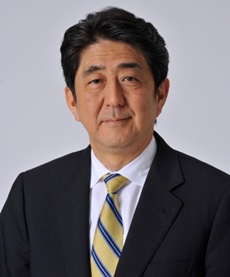Japan PM dissolves lower House, to seek fresh mandate on 14 December
21 Nov 2014
 Prime minister Shinzo Abe dissolved parliament's lower house today for a snap election on 14 December as he sought fresh mandate for his struggling "Abenomics" revival strategy just two years after his return to power promising that "Japan is Back", reported.
Prime minister Shinzo Abe dissolved parliament's lower house today for a snap election on 14 December as he sought fresh mandate for his struggling "Abenomics" revival strategy just two years after his return to power promising that "Japan is Back", reported.
Abe had vowed to revive the economy with a mix an easy monetary policy, government spending and reforms, even as he sought to move ahead with plans to rein in Japan's massive public debt.
In order to reduce public debt, Abe raised consumption tax from 5 per cent to 8 per cent in April this year - a 3 perentage rise - and is now considering whether or not to raise it further to 10 per cent in October 2015, as planned.
''A raise in the consumption tax rate is necessary in order for Japan to pass down to the next generation a social security system that is one of the best in the world and in order to enhance our support for child-rearing. It is precisely for these reasons that during the days of the government led by the DPJ, we the LDP supported the bills to reform the tax system, even as an opposition party,'' he told the media at a press conference early this week.
However doubts regarding his strategy are increasing, especially after data showed this week that the economy had rather undexpectedly slipped into recession in the third quarter following an initial increase in the sales tax to 8 per cent from April.
If raising the consumption tax causes the economy to falter, it will impart a major strain upon people's daily lives. And if, as a result, tax revenues do not increase despite raising the tax rate, then no benefits will derive from it. The economy is a living thing.
"This is an 'Abenomics' snap election. Will 'Abenomics' go forward, or stop in its tracks? That is the question in this election," Abe told the news conference. "Are our economic policies a mistake, or are they correct? Is there really any other way? This is what we want to ask all the people."
Abe had said he would delay for 18 months a second tax hike to 10 per cent that would come into effect in October 2015. He pledged that the second increase, which, according to advocates was needed to fund the bulging social security costs of a fast-ageing population, would go ahead in April 2017.
Japan's largest opposition party plans to fight Abe on the economy in next month's election, challenging him on turf he claimed as his own.
According to Yukio Edano, secretary-general of the Democratic Party of Japan, which lost power to Abe's Liberal Democratic Party in December 2012, the party wanted to land a counter-punch just where he probably felt confident: the economy.
Share prices were rising, but for many Japanese people, life was becoming harder, he added.
The Democrats would seek to cut the two-thirds majority of Abe's ruling coalition in the lower house.
In an interaction with reporters in Tokyo today, Edano criticised Abe for his attacks on the DPJ's economic record, under his party Japan experienced faster growth.
Japan had notched up an economic growth of 5.2 per cent in real terms over a period that roughly correlated with the DPJ's spell in power from September 2009 through December 2012. While the economy expanded 2.5 per cent in 2013 under Abe, sales-tax increase in April had triggered a recession.


















